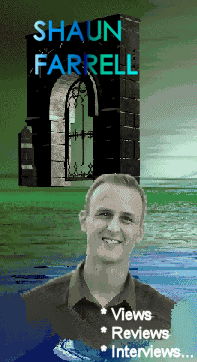|
June 2005
Star Wars Episode III: Revenge of the Sith
A film by George Lucas
A Neal Porter Book, 2003
March 2005, Bantam Dell
 The wait is over, the dark side draws nigh, but has George Lucas delivered that Star Wars movie his long term fans have been waiting for? In a word: pretty damn close. With Episode III: Revenge of the Sith, Lucas delivers a visually stunning, emotionally intense, dark child of a story that brilliantly connects the original trilogy to his prequels.
The wait is over, the dark side draws nigh, but has George Lucas delivered that Star Wars movie his long term fans have been waiting for? In a word: pretty damn close. With Episode III: Revenge of the Sith, Lucas delivers a visually stunning, emotionally intense, dark child of a story that brilliantly connects the original trilogy to his prequels.
I must admit that I did not care for Episode I or Episode II, although the second was slightly better than the first. Episode III shares some of the pitfalls of those previous efforts. The scenes between Padme and Anakin are awkward at best, the dialogue is excruciatingly painful in places, and the acting, at times, still seems flat and unfelt where it should be impassioned. Despite these shortcomings, Revenge of the Sith manages to do what its prequel predecessors could not: establish an emotional connection with the audience—and this despite the fact that the outcome of the story is already known!
Performancewise, I must give the nod to Ian McDiarmid for his dramatic portrayal of Emperor Palpatine. I have heard some people complain that the actor was overdramatic. I say that, yes, at times heís a bitÖover the top, but at least heís interesting! In a trilogy of films where the actors have struggled with stiff dialogue, McDiarmid revels in his evil with passionate glee. R2-D2 is also a pleasant surprise, providing quite a bit of humor in the filmís opening sequences. It seems that the R2 of the original trilogy was in sore need of maintenance, for in Episode III it has the ability to fly and battle tactically superior droids! Ewan McGregor portrays a wiser and more loving Obi-Wan Kenobi. He does an excellent job showing how his relationship with Anakin has changed from teacher to friend. Natalie Portmanís Padme has been reduced from a powerful heroine to a stay-at-home-pregnant-wife who has nothing better to do than stare out the window or comb her hair on the balcony. Despite her lessened involvement in the story, Portman achieves a sincerity she lacked in the previous films. This is by far her best work in the trilogy as we experience her love for Anakin and her despair when she loses him. Finally, Hayden Christensen has the difficult task of convincing us that a good person can become completely evil. Heís a bit whiny at times (much like Luke in A New Hope), but he completes the task with just enough fervor to make it believable. From the outset of the film, Christensen plays on Anakinís weaknesses: his passion, his desire to be the best, and his pride. The term hubris, meaning overweening pride, is used in Greek tragedy to define the emotion that will lead to the heroís downfall. Much like Oedipus and Creon, Anakin Skywalker falls prey to his hubris, and, just like these tragic Greek figures, he loses everything he holds dear.
Lucas does an excellent job of tying together multiple threads from the original trilogy to this film. We get to see the Wookie homeworld and are enlightened with the knowledge that Yoda and Chewbacca are friends. We also see a great battle that seemingly leads to the Wookies slavery to the Empire. We see how Palpatine is able to convince the Senate to grant him supreme powers and establish the Empire, how he turns the public against the Jedi, how he manipulates a confused young man for his own needs, and how he becomes physically deformed by dark side powers. We see the dismantling of the droid armies. We meet a young Bail Organa and even see a shinier version of the ship Leia uses to smuggle Death Star plans to Tatooine. We see the birth of the twins and their impending separation. We see how Yoda was taught to communicate beyond the grave by Qui-Gon Jinn. Yoda then promises to teach Obi-won this skill. This helps clarify a question Iíve had since Episode I: why donít the bodies of fallen Jedi disappear like Yoda and Obi-Wan do after death? It would appear that this new knowledge of the Force is the key. Lucas even remembers to wipe C-3POís memories, explaining why the droid doesnít remember the past. We see the development of the Death Star, a young Grand Moff Tarkin, and the predecessors to Star Destroyers, X-wings, TIE Fighters, Imperial Shuttles, and more. And, of course, the whole point of the film, we see the birth of Darth Vader and how passion can lead to hatred and evil.
As good as this film is, I can only rank it third best among the six movies of the saga behind Empire and Jedi. Visually it is by far superior, and the action sequences are some of the best ever filmed for science fiction cinematography, but the chemistry of the original films cannot be matched. There is no doubt, however, that this is the best of the Star Wars films directed and written (referring to screenplay credit here) by Lucas. The pace is unrelenting, the stakes are high, and the drama reaches previously unattained heights. Star Wars fans old and new have a treasure here. If it really must be the end of that galaxy far, far away, we should be grateful that Lucas turned to the dark side, for he was all the more powerful for it.
|


 The wait is over, the dark side draws nigh, but has George Lucas delivered that Star Wars movie his long term fans have been waiting for? In a word: pretty damn close. With Episode III: Revenge of the Sith, Lucas delivers a visually stunning, emotionally intense, dark child of a story that brilliantly connects the original trilogy to his prequels.
The wait is over, the dark side draws nigh, but has George Lucas delivered that Star Wars movie his long term fans have been waiting for? In a word: pretty damn close. With Episode III: Revenge of the Sith, Lucas delivers a visually stunning, emotionally intense, dark child of a story that brilliantly connects the original trilogy to his prequels.
